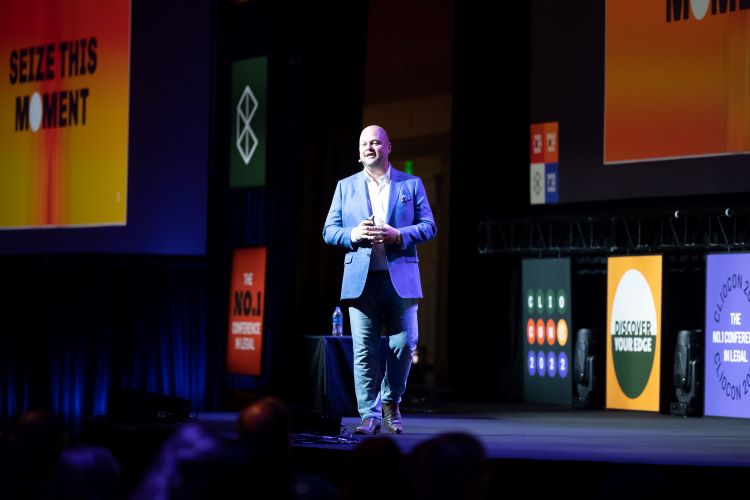Legal industry boom comes with workplace challenges, says Clio’s 2022 Legal Trends Report

Clio CEO and founder Jack Newton speaks at the 2022 Clio Cloud Conference on Oct. 10. Photo courtesy of Clio.
Despite economic turbulence, pandemic-era disruptions and rising inflation, the legal industry has thrived, with increased demand for legal services. But that growth comes with challenges as the profession reckons with the “Great Resignation” and shifts in workplace culture. Those were some of the takeaways from Clio’s seventh annual Legal Trends Report, which company founder and CEO Jack Newton unveiled Monday.
Speaking from the stage at the first in-person Clio Cloud Conference since 2019, Newton told a packed ballroom at the Gaylord Opryland Resort & Convention Center in Nashville, Tennessee, that the report shows law firms have absorbed the shockwaves of the past two-and-a-half years to remain resilient and even thrive.
And tech played a central role as firms have met client needs and lawyers’ demands to redefine their roles in the workplace.
“What it reinforces is that you are finding new ways of operating. You are champions of this new way of working and you are working efficiently even in the face of adversity,” Newton said during his keynote address.
But he added a note of caution: “While the industry has persevered through a global pandemic and the great lockdown, it’s clear that we are a ways away from smooth water.”
Clio released the 80-page report on Monday. It draws from aggregated and anonymized data from tens of thousands of legal professionals and surveyed 1,134 legal professionals, 458 professionals from other industries and 1,168 consumers from the general population.
The report states that demand for legal services had reached record highs as pandemic-related disruptions gave way to the buildup in demand for legal services.
Average caseloads among law firms had increased 10% from March 2021 to August 2022 compared to 2019. In the same period, average billable hours were 22% higher. The report also says the number of hours billed to clients rose an average of 28% and the average collected revenue increased by 31%.
The report also looks at how the “Great Resignation” has impacted the industry, with resignation rates as high as 19% in the last 12 months, Newton said.
According to the report, of the one in five lawyers who changed their job in the year prior to April 2022, 37% said work-life balance was the reason for making a move.
That was on par with the percentage of lawyers who said they left their jobs for better pay.
“It used to be if you wanted to hire top talent at a law firm, you just had to pay top dollar and that talent would come to you,” Newton said. “And what has shifted dramatically in the 2022 Legal Trends Report is that law firm culture matters more than it ever has before in attracting and retaining top talent.”
The report also offers some insight on the impact of shifts in law firm culture.
Before 2020, approximately 40% of lawyers worked exclusively at their offices; now it’s less than 30%, according to the report.
Lawyers appear divided on the issue of remote work, however, with about half of those surveyed saying they prefer working from home.
The report also finds that 86% of lawyers say they work outside a regular 9-to-5 work schedule, with 73% of respondents saying they were willing to communicate with clients over the weekend. “Most clients want the option to meet or at least communicate with their lawyer during evenings or weekends,” the report states. “This is likely because meeting during a regular business day can be inconvenient for clients.”
Newton told the ABA Journal that even in challenging economic times, there will still be an onus on attracting prime talent and creating flexible work environments that allow lawyers to do their best work.
“I don’t think it’s ever swinging back to where it was pre-COVID,” Newton said. “We’re going to see a permanent change in the flexibility that the average law firm will offer its employees.”
Newton also suggested during his keynote address that cloud-based legal practice management software will be central to firms in trying times.
He introduced the concept of the “anti-fragile” law firm to describe firms that will do more than just weather coming storms, they also will find ways to innovate using technology.
In the next decade, along with shifting client expectations, law firms will be exposed to other stressors which could include “global instability, an oncoming recession and regulatory reform,” Newton said.
“If we think about building anti-fragile law firms, I believe we’ll all be better equipped to drive fundamental transformation in the legal industry and to emerge from these challenges stronger than before,” the CEO said.
During the keynote speech, Newton also revealed several new Clio features and updates, including a website builder called Clio Grow which allows firms to quickly build an online presence; text messaging functionality to enable lawyers to securely communicate with clients; personalized billing features; and advanced integrations with third-party apps.
“You can go from not having a website to having one of the most sophisticated legal websites on the planet in less than 10 minutes,” Newton said of Clio Grow.
The two-day event is Clio’s first hybrid conference, with more than 2,000 people expected to attend in person and 1,000 expected to participate virtually from 22 countries around the world, including the United Kingdom, India, the Philippines and Switzerland.



